Social Cognition in Psychology: Exploring Factors Influencing Response
VerifiedAdded on 2023/05/30
|8
|1777
|409
Essay
AI Summary
This essay delves into the topic of social cognition within psychology, defining it as the factors influencing an individual's sense of belonging to a social group. It discusses how individuals interpret the world and react to situations, referencing concepts like social referencing, where learning occurs through observation. The importance of metacognitive processes, involving memory, perception, and attention, is highlighted. Factors influencing human responses, such as childhood environment, culture, and education, are explored, noting how these elements shape individual interpretations. The essay concludes by emphasizing the importance of understanding diverse responses and avoiding premature judgment, given the vastness of the world and differing perspectives. Desklib offers a wealth of resources, including past papers and solved assignments, to support students in their academic endeavors.
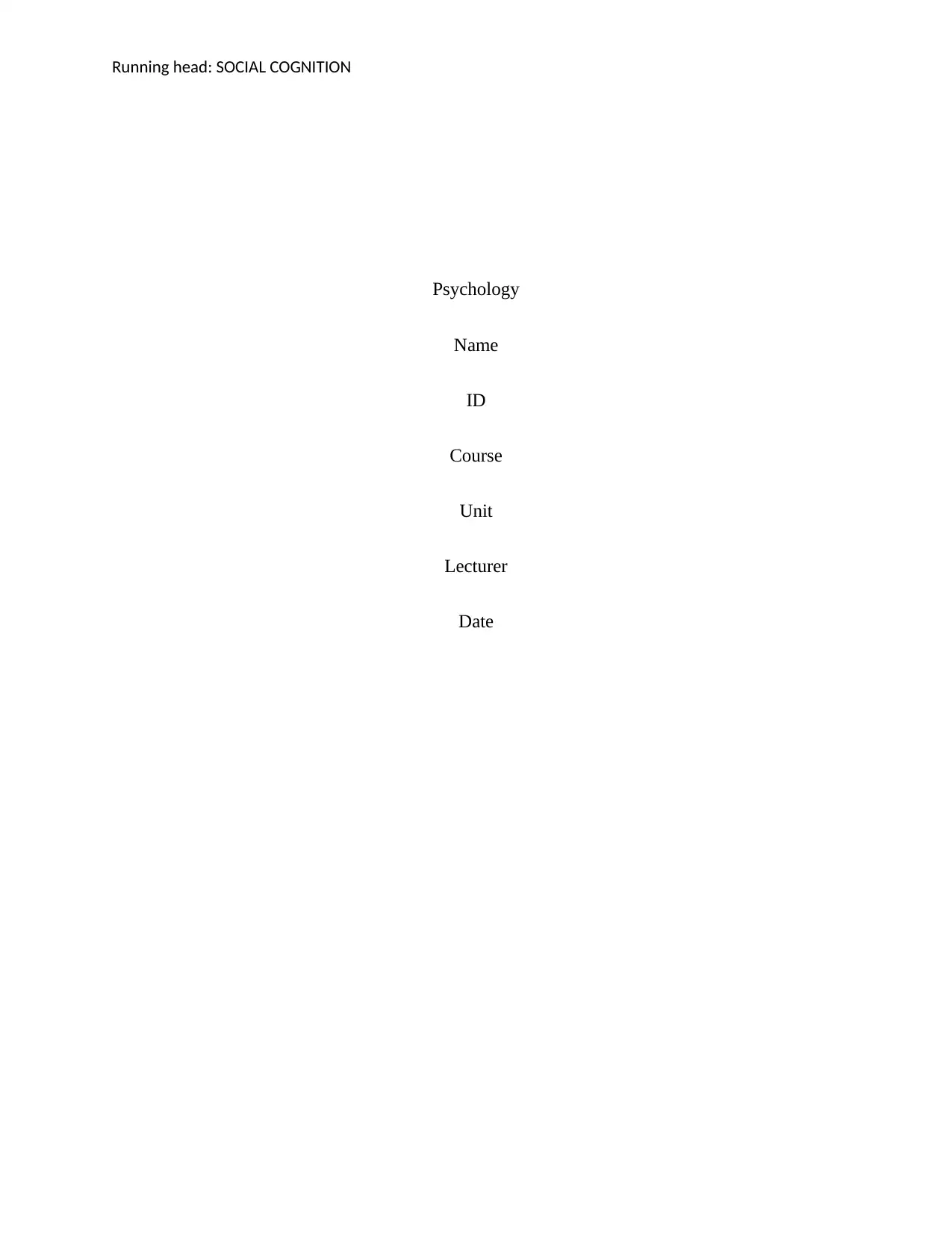
Running head: SOCIAL COGNITION
Psychology
Name
ID
Course
Unit
Lecturer
Date
Psychology
Name
ID
Course
Unit
Lecturer
Date
Paraphrase This Document
Need a fresh take? Get an instant paraphrase of this document with our AI Paraphraser
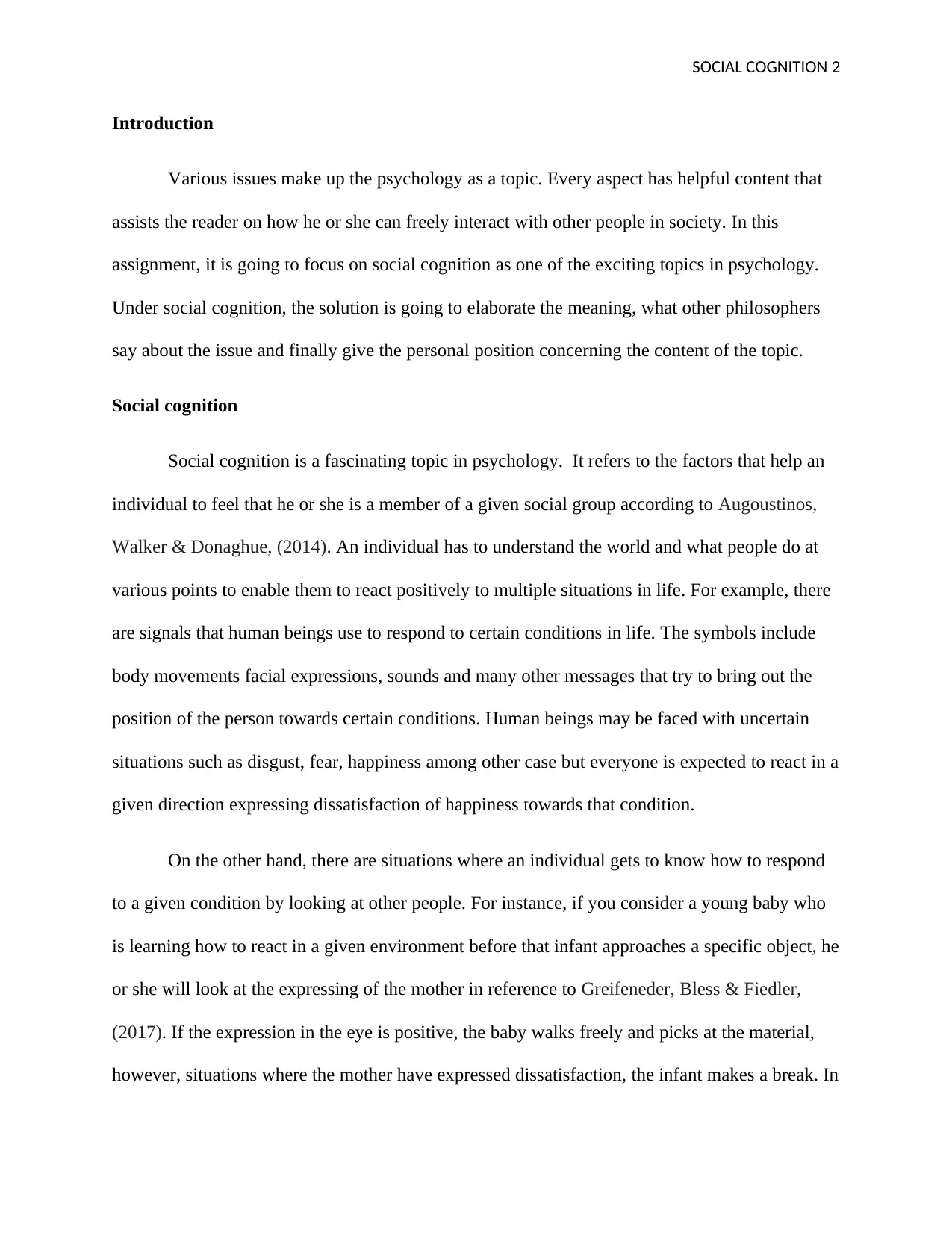
SOCIAL COGNITION 2
Introduction
Various issues make up the psychology as a topic. Every aspect has helpful content that
assists the reader on how he or she can freely interact with other people in society. In this
assignment, it is going to focus on social cognition as one of the exciting topics in psychology.
Under social cognition, the solution is going to elaborate the meaning, what other philosophers
say about the issue and finally give the personal position concerning the content of the topic.
Social cognition
Social cognition is a fascinating topic in psychology. It refers to the factors that help an
individual to feel that he or she is a member of a given social group according to Augoustinos,
Walker & Donaghue, (2014). An individual has to understand the world and what people do at
various points to enable them to react positively to multiple situations in life. For example, there
are signals that human beings use to respond to certain conditions in life. The symbols include
body movements facial expressions, sounds and many other messages that try to bring out the
position of the person towards certain conditions. Human beings may be faced with uncertain
situations such as disgust, fear, happiness among other case but everyone is expected to react in a
given direction expressing dissatisfaction of happiness towards that condition.
On the other hand, there are situations where an individual gets to know how to respond
to a given condition by looking at other people. For instance, if you consider a young baby who
is learning how to react in a given environment before that infant approaches a specific object, he
or she will look at the expressing of the mother in reference to Greifeneder, Bless & Fiedler,
(2017). If the expression in the eye is positive, the baby walks freely and picks at the material,
however, situations where the mother have expressed dissatisfaction, the infant makes a break. In
Introduction
Various issues make up the psychology as a topic. Every aspect has helpful content that
assists the reader on how he or she can freely interact with other people in society. In this
assignment, it is going to focus on social cognition as one of the exciting topics in psychology.
Under social cognition, the solution is going to elaborate the meaning, what other philosophers
say about the issue and finally give the personal position concerning the content of the topic.
Social cognition
Social cognition is a fascinating topic in psychology. It refers to the factors that help an
individual to feel that he or she is a member of a given social group according to Augoustinos,
Walker & Donaghue, (2014). An individual has to understand the world and what people do at
various points to enable them to react positively to multiple situations in life. For example, there
are signals that human beings use to respond to certain conditions in life. The symbols include
body movements facial expressions, sounds and many other messages that try to bring out the
position of the person towards certain conditions. Human beings may be faced with uncertain
situations such as disgust, fear, happiness among other case but everyone is expected to react in a
given direction expressing dissatisfaction of happiness towards that condition.
On the other hand, there are situations where an individual gets to know how to respond
to a given condition by looking at other people. For instance, if you consider a young baby who
is learning how to react in a given environment before that infant approaches a specific object, he
or she will look at the expressing of the mother in reference to Greifeneder, Bless & Fiedler,
(2017). If the expression in the eye is positive, the baby walks freely and picks at the material,
however, situations where the mother have expressed dissatisfaction, the infant makes a break. In
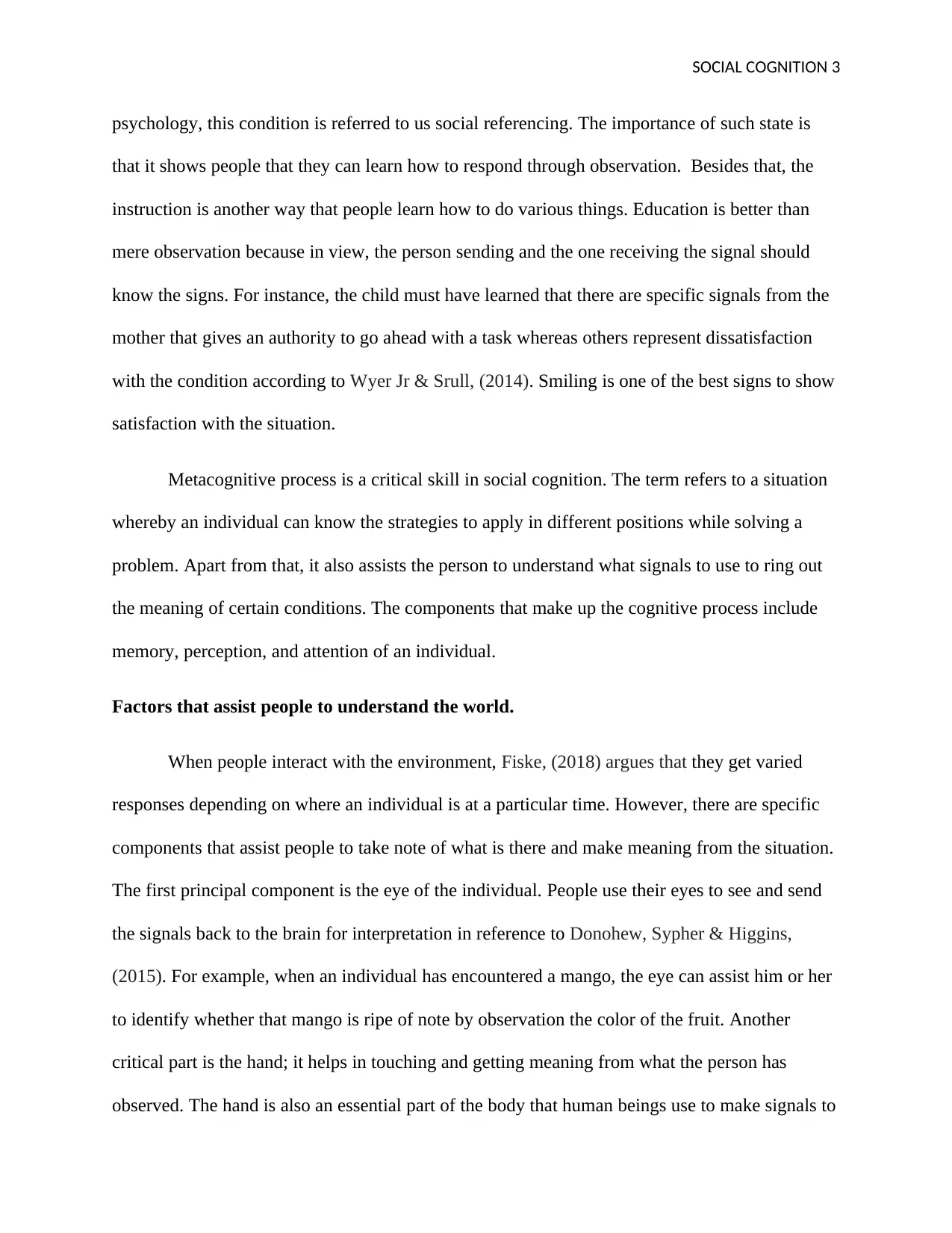
SOCIAL COGNITION 3
psychology, this condition is referred to us social referencing. The importance of such state is
that it shows people that they can learn how to respond through observation. Besides that, the
instruction is another way that people learn how to do various things. Education is better than
mere observation because in view, the person sending and the one receiving the signal should
know the signs. For instance, the child must have learned that there are specific signals from the
mother that gives an authority to go ahead with a task whereas others represent dissatisfaction
with the condition according to Wyer Jr & Srull, (2014). Smiling is one of the best signs to show
satisfaction with the situation.
Metacognitive process is a critical skill in social cognition. The term refers to a situation
whereby an individual can know the strategies to apply in different positions while solving a
problem. Apart from that, it also assists the person to understand what signals to use to ring out
the meaning of certain conditions. The components that make up the cognitive process include
memory, perception, and attention of an individual.
Factors that assist people to understand the world.
When people interact with the environment, Fiske, (2018) argues that they get varied
responses depending on where an individual is at a particular time. However, there are specific
components that assist people to take note of what is there and make meaning from the situation.
The first principal component is the eye of the individual. People use their eyes to see and send
the signals back to the brain for interpretation in reference to Donohew, Sypher & Higgins,
(2015). For example, when an individual has encountered a mango, the eye can assist him or her
to identify whether that mango is ripe of note by observation the color of the fruit. Another
critical part is the hand; it helps in touching and getting meaning from what the person has
observed. The hand is also an essential part of the body that human beings use to make signals to
psychology, this condition is referred to us social referencing. The importance of such state is
that it shows people that they can learn how to respond through observation. Besides that, the
instruction is another way that people learn how to do various things. Education is better than
mere observation because in view, the person sending and the one receiving the signal should
know the signs. For instance, the child must have learned that there are specific signals from the
mother that gives an authority to go ahead with a task whereas others represent dissatisfaction
with the condition according to Wyer Jr & Srull, (2014). Smiling is one of the best signs to show
satisfaction with the situation.
Metacognitive process is a critical skill in social cognition. The term refers to a situation
whereby an individual can know the strategies to apply in different positions while solving a
problem. Apart from that, it also assists the person to understand what signals to use to ring out
the meaning of certain conditions. The components that make up the cognitive process include
memory, perception, and attention of an individual.
Factors that assist people to understand the world.
When people interact with the environment, Fiske, (2018) argues that they get varied
responses depending on where an individual is at a particular time. However, there are specific
components that assist people to take note of what is there and make meaning from the situation.
The first principal component is the eye of the individual. People use their eyes to see and send
the signals back to the brain for interpretation in reference to Donohew, Sypher & Higgins,
(2015). For example, when an individual has encountered a mango, the eye can assist him or her
to identify whether that mango is ripe of note by observation the color of the fruit. Another
critical part is the hand; it helps in touching and getting meaning from what the person has
observed. The hand is also an essential part of the body that human beings use to make signals to
⊘ This is a preview!⊘
Do you want full access?
Subscribe today to unlock all pages.

Trusted by 1+ million students worldwide
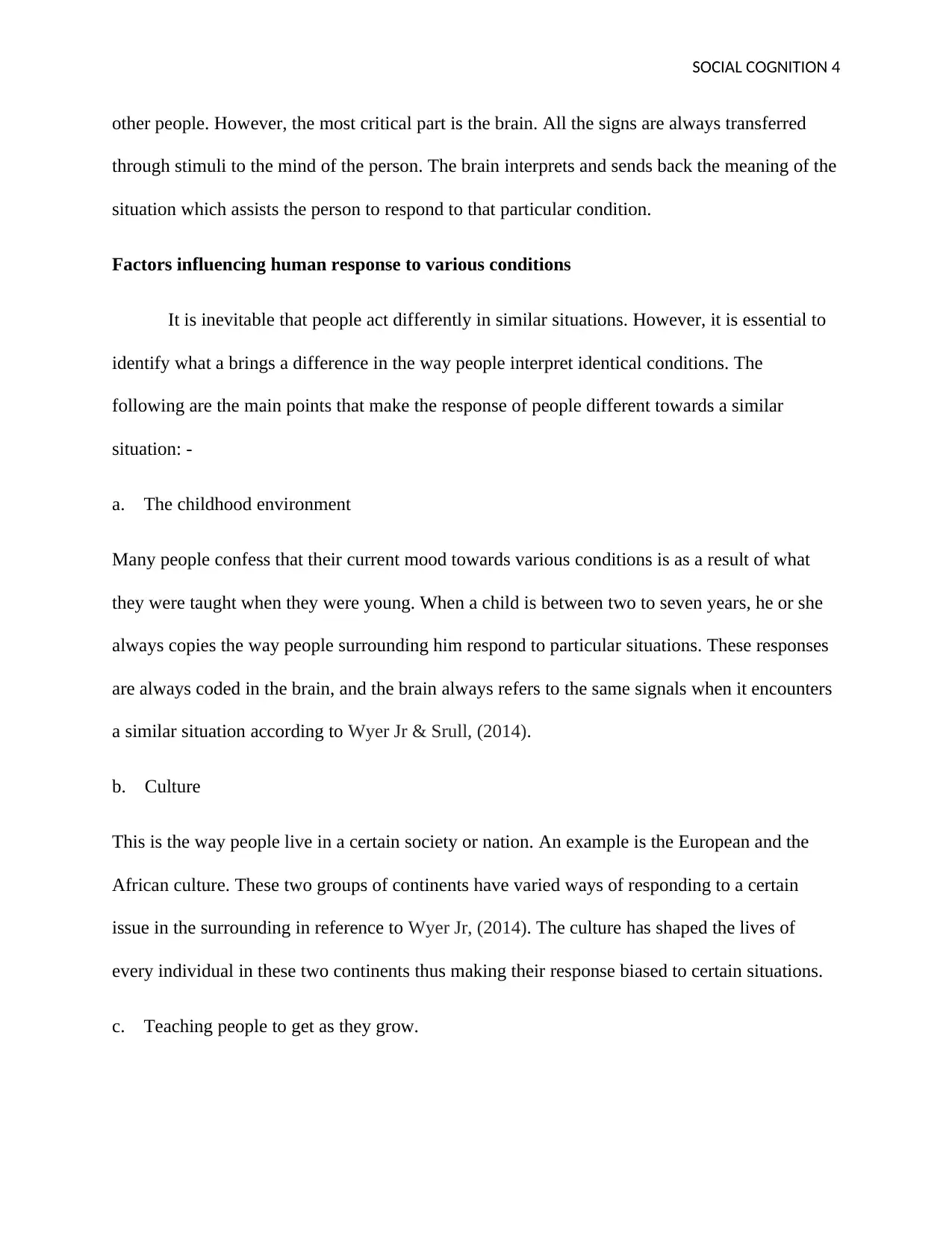
SOCIAL COGNITION 4
other people. However, the most critical part is the brain. All the signs are always transferred
through stimuli to the mind of the person. The brain interprets and sends back the meaning of the
situation which assists the person to respond to that particular condition.
Factors influencing human response to various conditions
It is inevitable that people act differently in similar situations. However, it is essential to
identify what a brings a difference in the way people interpret identical conditions. The
following are the main points that make the response of people different towards a similar
situation: -
a. The childhood environment
Many people confess that their current mood towards various conditions is as a result of what
they were taught when they were young. When a child is between two to seven years, he or she
always copies the way people surrounding him respond to particular situations. These responses
are always coded in the brain, and the brain always refers to the same signals when it encounters
a similar situation according to Wyer Jr & Srull, (2014).
b. Culture
This is the way people live in a certain society or nation. An example is the European and the
African culture. These two groups of continents have varied ways of responding to a certain
issue in the surrounding in reference to Wyer Jr, (2014). The culture has shaped the lives of
every individual in these two continents thus making their response biased to certain situations.
c. Teaching people to get as they grow.
other people. However, the most critical part is the brain. All the signs are always transferred
through stimuli to the mind of the person. The brain interprets and sends back the meaning of the
situation which assists the person to respond to that particular condition.
Factors influencing human response to various conditions
It is inevitable that people act differently in similar situations. However, it is essential to
identify what a brings a difference in the way people interpret identical conditions. The
following are the main points that make the response of people different towards a similar
situation: -
a. The childhood environment
Many people confess that their current mood towards various conditions is as a result of what
they were taught when they were young. When a child is between two to seven years, he or she
always copies the way people surrounding him respond to particular situations. These responses
are always coded in the brain, and the brain always refers to the same signals when it encounters
a similar situation according to Wyer Jr & Srull, (2014).
b. Culture
This is the way people live in a certain society or nation. An example is the European and the
African culture. These two groups of continents have varied ways of responding to a certain
issue in the surrounding in reference to Wyer Jr, (2014). The culture has shaped the lives of
every individual in these two continents thus making their response biased to certain situations.
c. Teaching people to get as they grow.
Paraphrase This Document
Need a fresh take? Get an instant paraphrase of this document with our AI Paraphraser
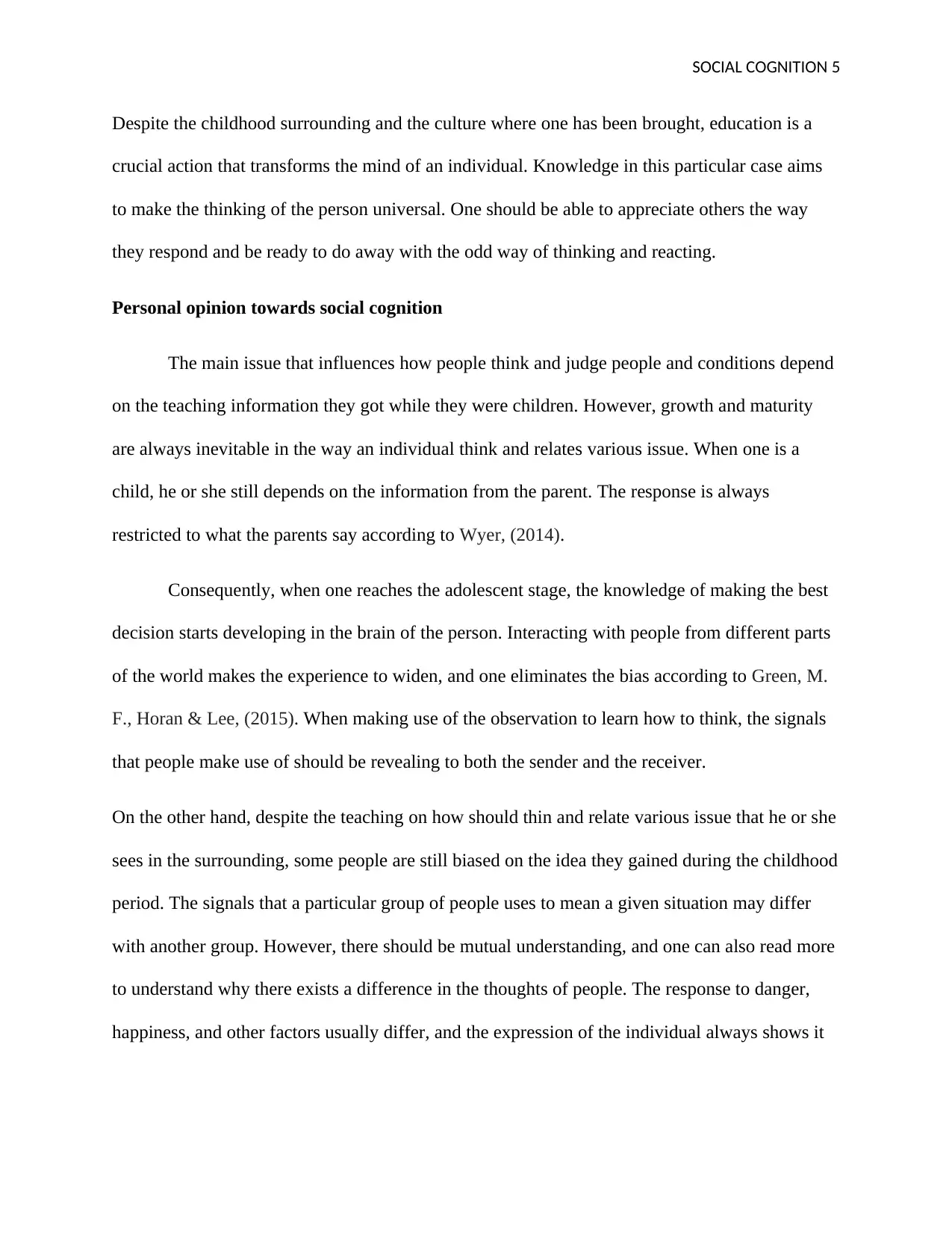
SOCIAL COGNITION 5
Despite the childhood surrounding and the culture where one has been brought, education is a
crucial action that transforms the mind of an individual. Knowledge in this particular case aims
to make the thinking of the person universal. One should be able to appreciate others the way
they respond and be ready to do away with the odd way of thinking and reacting.
Personal opinion towards social cognition
The main issue that influences how people think and judge people and conditions depend
on the teaching information they got while they were children. However, growth and maturity
are always inevitable in the way an individual think and relates various issue. When one is a
child, he or she still depends on the information from the parent. The response is always
restricted to what the parents say according to Wyer, (2014).
Consequently, when one reaches the adolescent stage, the knowledge of making the best
decision starts developing in the brain of the person. Interacting with people from different parts
of the world makes the experience to widen, and one eliminates the bias according to Green, M.
F., Horan & Lee, (2015). When making use of the observation to learn how to think, the signals
that people make use of should be revealing to both the sender and the receiver.
On the other hand, despite the teaching on how should thin and relate various issue that he or she
sees in the surrounding, some people are still biased on the idea they gained during the childhood
period. The signals that a particular group of people uses to mean a given situation may differ
with another group. However, there should be mutual understanding, and one can also read more
to understand why there exists a difference in the thoughts of people. The response to danger,
happiness, and other factors usually differ, and the expression of the individual always shows it
Despite the childhood surrounding and the culture where one has been brought, education is a
crucial action that transforms the mind of an individual. Knowledge in this particular case aims
to make the thinking of the person universal. One should be able to appreciate others the way
they respond and be ready to do away with the odd way of thinking and reacting.
Personal opinion towards social cognition
The main issue that influences how people think and judge people and conditions depend
on the teaching information they got while they were children. However, growth and maturity
are always inevitable in the way an individual think and relates various issue. When one is a
child, he or she still depends on the information from the parent. The response is always
restricted to what the parents say according to Wyer, (2014).
Consequently, when one reaches the adolescent stage, the knowledge of making the best
decision starts developing in the brain of the person. Interacting with people from different parts
of the world makes the experience to widen, and one eliminates the bias according to Green, M.
F., Horan & Lee, (2015). When making use of the observation to learn how to think, the signals
that people make use of should be revealing to both the sender and the receiver.
On the other hand, despite the teaching on how should thin and relate various issue that he or she
sees in the surrounding, some people are still biased on the idea they gained during the childhood
period. The signals that a particular group of people uses to mean a given situation may differ
with another group. However, there should be mutual understanding, and one can also read more
to understand why there exists a difference in the thoughts of people. The response to danger,
happiness, and other factors usually differ, and the expression of the individual always shows it
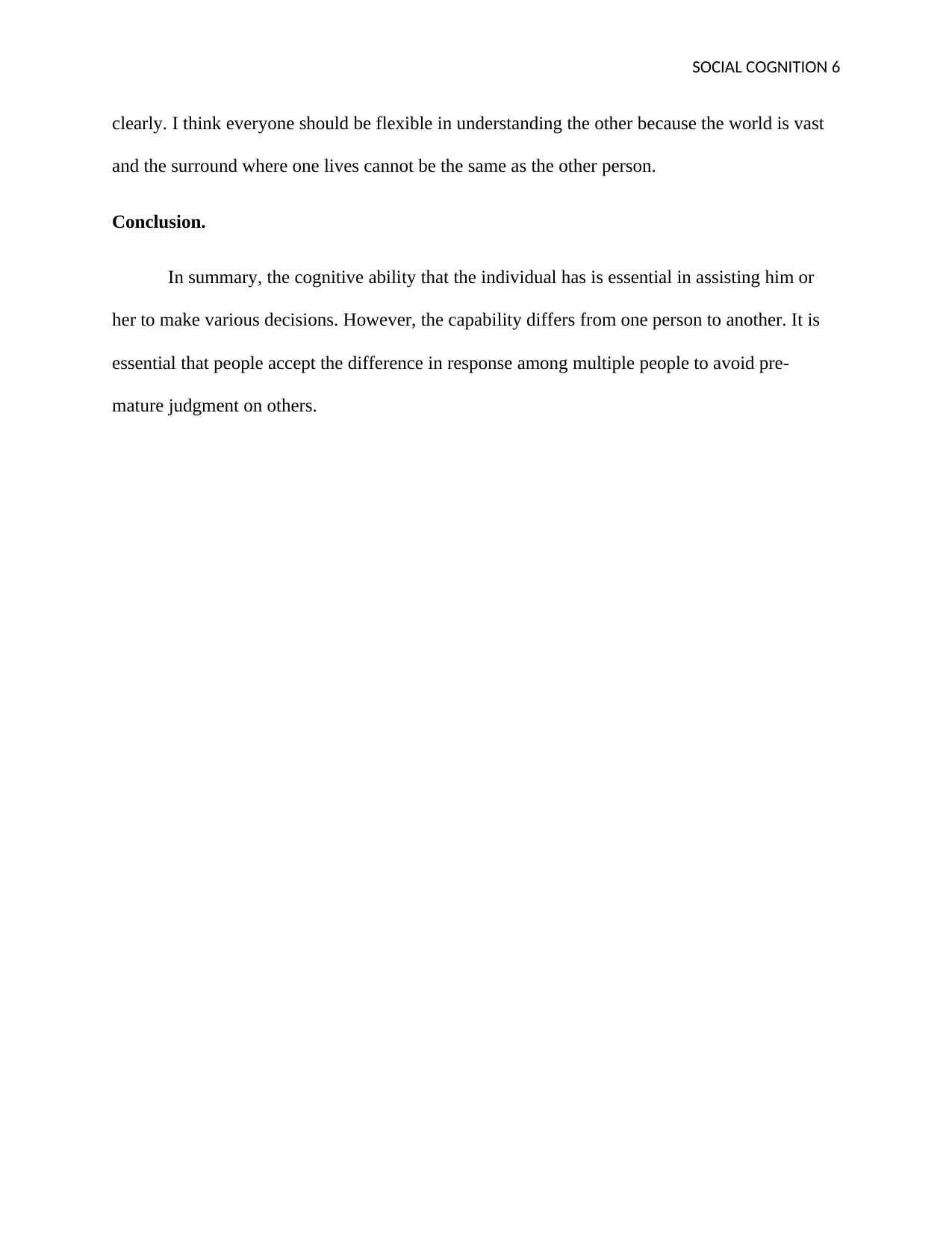
SOCIAL COGNITION 6
clearly. I think everyone should be flexible in understanding the other because the world is vast
and the surround where one lives cannot be the same as the other person.
Conclusion.
In summary, the cognitive ability that the individual has is essential in assisting him or
her to make various decisions. However, the capability differs from one person to another. It is
essential that people accept the difference in response among multiple people to avoid pre-
mature judgment on others.
clearly. I think everyone should be flexible in understanding the other because the world is vast
and the surround where one lives cannot be the same as the other person.
Conclusion.
In summary, the cognitive ability that the individual has is essential in assisting him or
her to make various decisions. However, the capability differs from one person to another. It is
essential that people accept the difference in response among multiple people to avoid pre-
mature judgment on others.
⊘ This is a preview!⊘
Do you want full access?
Subscribe today to unlock all pages.

Trusted by 1+ million students worldwide
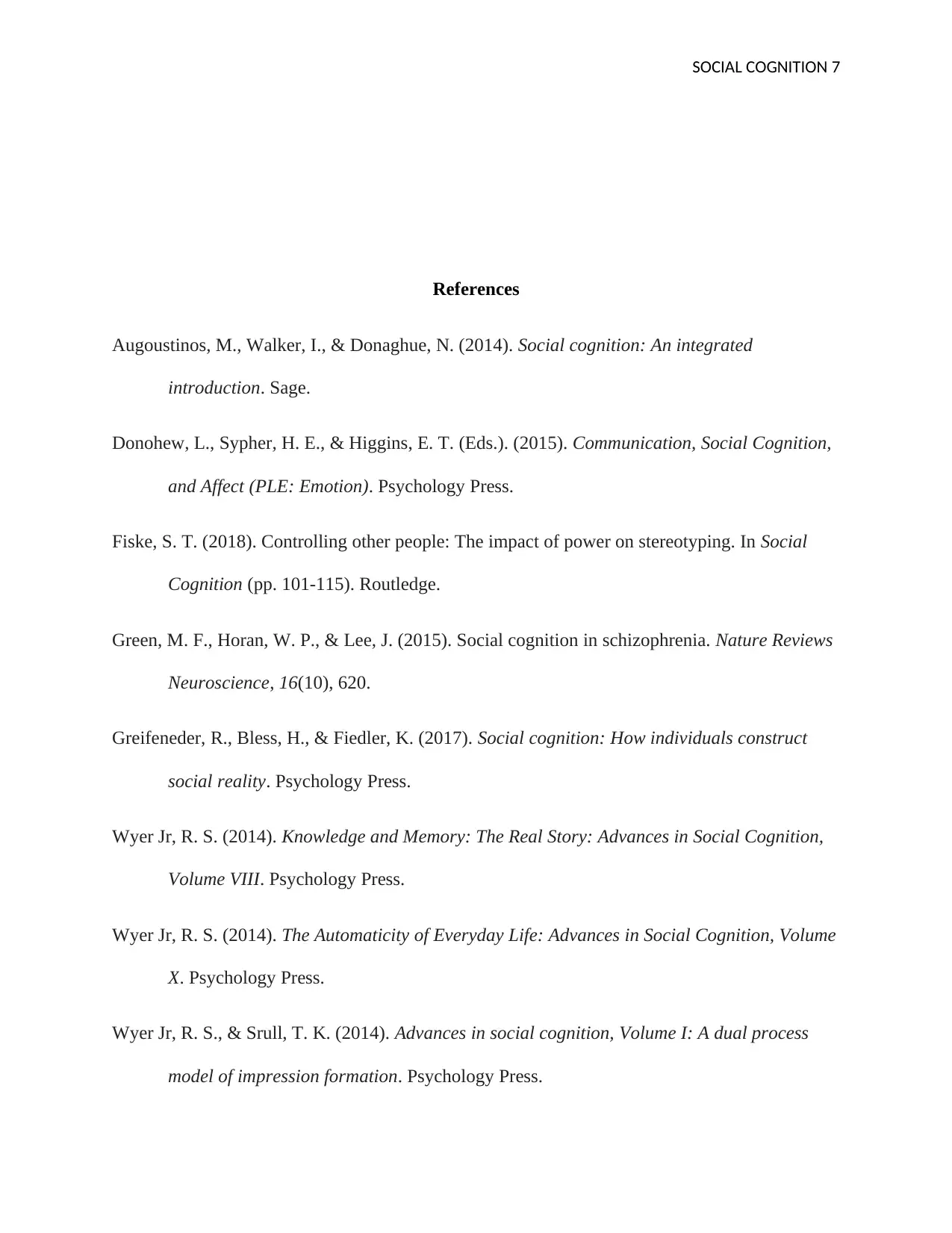
SOCIAL COGNITION 7
References
Augoustinos, M., Walker, I., & Donaghue, N. (2014). Social cognition: An integrated
introduction. Sage.
Donohew, L., Sypher, H. E., & Higgins, E. T. (Eds.). (2015). Communication, Social Cognition,
and Affect (PLE: Emotion). Psychology Press.
Fiske, S. T. (2018). Controlling other people: The impact of power on stereotyping. In Social
Cognition (pp. 101-115). Routledge.
Green, M. F., Horan, W. P., & Lee, J. (2015). Social cognition in schizophrenia. Nature Reviews
Neuroscience, 16(10), 620.
Greifeneder, R., Bless, H., & Fiedler, K. (2017). Social cognition: How individuals construct
social reality. Psychology Press.
Wyer Jr, R. S. (2014). Knowledge and Memory: The Real Story: Advances in Social Cognition,
Volume VIII. Psychology Press.
Wyer Jr, R. S. (2014). The Automaticity of Everyday Life: Advances in Social Cognition, Volume
X. Psychology Press.
Wyer Jr, R. S., & Srull, T. K. (2014). Advances in social cognition, Volume I: A dual process
model of impression formation. Psychology Press.
References
Augoustinos, M., Walker, I., & Donaghue, N. (2014). Social cognition: An integrated
introduction. Sage.
Donohew, L., Sypher, H. E., & Higgins, E. T. (Eds.). (2015). Communication, Social Cognition,
and Affect (PLE: Emotion). Psychology Press.
Fiske, S. T. (2018). Controlling other people: The impact of power on stereotyping. In Social
Cognition (pp. 101-115). Routledge.
Green, M. F., Horan, W. P., & Lee, J. (2015). Social cognition in schizophrenia. Nature Reviews
Neuroscience, 16(10), 620.
Greifeneder, R., Bless, H., & Fiedler, K. (2017). Social cognition: How individuals construct
social reality. Psychology Press.
Wyer Jr, R. S. (2014). Knowledge and Memory: The Real Story: Advances in Social Cognition,
Volume VIII. Psychology Press.
Wyer Jr, R. S. (2014). The Automaticity of Everyday Life: Advances in Social Cognition, Volume
X. Psychology Press.
Wyer Jr, R. S., & Srull, T. K. (2014). Advances in social cognition, Volume I: A dual process
model of impression formation. Psychology Press.
Paraphrase This Document
Need a fresh take? Get an instant paraphrase of this document with our AI Paraphraser

SOCIAL COGNITION 8
Wyer Jr, R. S., & Srull, T. K. (Eds.). (2014). The Content, Structure, and Operation of Thought
Systems: Advances in Social Cognition (Vol. 4). Psychology Press.
Wyer Jr, R. S., & Srull, T. K. (Eds.). (2014). The Content, Structure, and Operation of Thought
Systems: Advances in Social Cognition (Vol. 4). Psychology Press.
1 out of 8
Related Documents
Your All-in-One AI-Powered Toolkit for Academic Success.
+13062052269
info@desklib.com
Available 24*7 on WhatsApp / Email
![[object Object]](/_next/static/media/star-bottom.7253800d.svg)
Unlock your academic potential
Copyright © 2020–2026 A2Z Services. All Rights Reserved. Developed and managed by ZUCOL.




